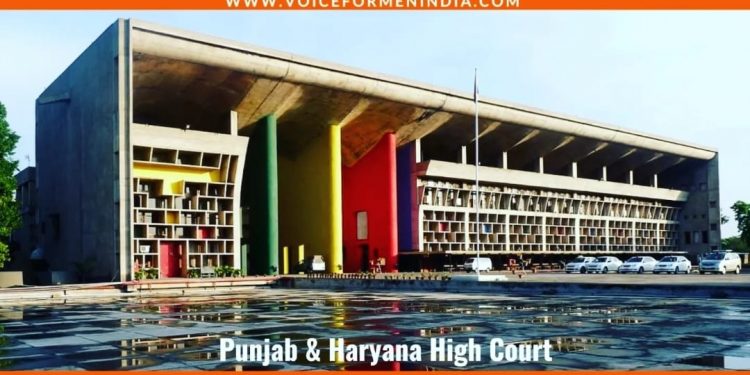Section 125 CrPC (4) disentitles a woman from receiving maintenance from her estranged husband, if she is living in adultery. It reads as follows:
125(4) No wife shall be entitled to receive an [allowance for the maintenance or the interim maintenance and expenses of proceeding, as the case may be], from her husband under this section if she is living in adultery, or if, without any sufficient reason, she refuses to live with her husband, or if they are living separately by mutual consent.
However, in its order dated September 19, 2022, the Punjab and Haryana High Court has observed that the timeline for the wife living in adultery is crucial to allow or disentitle her from receiving maintenance.
Case:
Couple got married in 2004 and have 3 minor children.
Allegations by Wife
In the year 2017, respondent no.1-wife has instituted a petition under Section 125 of the Code of Criminal Procedure for self and on behalf of three minor children alleging that the petitioner-husband has refused and neglected to maintain the respondents.
READ ORDER | Occasional Adultery By Wife Cannot Be A Ground To Deny Maintenance To Wife: Delhi High Court
Defence by Husband
The husband on the other hand alleged that the petition for maintenance by his wife was due to her alleged adulterous relationship, which she had admitted in writing executed on May 19, 2005. The husband has even sought to dispute the paternity of the children.
Learned counsel for the petitioner contends that in terms of the writing dated 19.05.2005, the wife had admitted the fact that she was carrying a child that did not belong to the husband, but someone from her village Bapas was the father of that child. Subsequently, she wanted to abort the child out of her own wish.
However, it has been further submitted that during the course of her cross-examination, wife has denied the fact of such writing. The petitioner, in 2019, applied to prove the writing by examining a handwriting expert.
Trial Court
When the husband demanded verification of handwriting, the wife argued that the said document was well within the knowledge of the husband and despite being given sufficient opportunity to produce evidence, he intentionally and deliberately moved the present application at a belated stage to fill up the lacuna in the case.
In view of this, the application was dismissed by the Trial Court. The husband then challenged the matter in High Court.
READ ORDER | Issue Of Adultery To Be Decided Later, Not During Grant Of Interim Maintenance To Wife: Delhi High Court
Punjab & Haryana High Court
At the outset, the bench of Justice Vivek Puri observed that although a discretion is vested in the trial Court to act as the exigencies of justice and circumstances of the case may require to permit a party to lead additional evidence, it has also to be borne in mind that such power cannot be exercised to permit any of the parties to fill up lacuna in its case.
Handwriting & Letter
With regards to verifying the handwriting of the letter written in 2005, the High Court said that the petitioner-husband was well within the knowledge of the alleged writing during the filing of the maintenance plea by the wife and he had even taken an objection to the main petition to dispute the claim of the respondents for maintenance, therefore, there was no justified reason for him to now initiate the exercise of proving the writing by examining a handwriting expert after displaying inaction for a period of two years, when the case was pending in the trial Court for his evidence.
READ JUDGEMENT | Wife Living In Adultery Not Entitled To Permanent Alimony: Punjab & Haryana High Court
Adultery by Wife
The High Court has deliberated the point in time when the wife was alleged to be living in adultery. The Court said that the material on record must indicate that the wife was living in adultery shortly before or after the petition of maintenance has been instituted. Justice Puri added,
A solitary act of adultery or an isolated lapse of wife, will not disentitle the wife to claim the maintenance.
The Court then elaborated on “what is living in adultery”? The Court said that maintenance can be declined, in the event, it is proved and established that the wife is living in adultery, however, “Living in adultery” means a continued adulterous conduct and not a single or occasional lapse.

While dismissing the plea of the husband, the High Court said,
It is not the case of the petitioner that shortly prior to the institution of the petition or subsequent thereto, the respondent no.1 is continuously living in adulterous life. The course of adulterous conduct must not be a matter of past, but must be continuing at the time of presentation of the petition.
The stale alleged act of adultery is indicative of the fact that such act has been condoned and consequently, the allegation to the effect that the respondent no.1 was living in adulterous life way back in the year 2005 cannot be termed to be a circumstance, which may be significant enough to dispute the claim of the respondents to claim maintenance from the petitioner.
This is also a significant circumstance which indicate that the proposed evidence is not essential to decide the controversy.
Leave your comments below:
READ ORDER | Solitary Act Of Adultery Or Isolated Lapse Of Wife Will Not Disentitle Her To Claim Maintenance: Punjab & Haryana High Court
— Voice For Men India (@voiceformenind) October 12, 2022
Justice Vivek Puri: "Must indicate that wife was living in adultery shortly before or after petition of maintenance"https://t.co/MolNpJbGgs
WATCH VIDEO:
When I Caught My Wife In Adultery, She Left Me & Snatched Away Our Kids | His Story
Join our Facebook Group or follow us on social media by clicking on the icons below
If you find value in our work, you may choose to donate to Voice For Men Foundation via Milaap OR via UPI: voiceformenindia@hdfcbank (80G tax exemption applicable)































